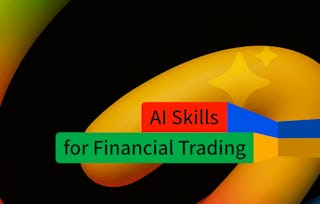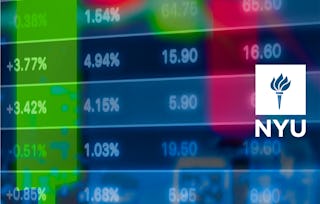This course provides the foundation for developing advanced trading strategies using machine learning techniques. In this course, you’ll review the key components that are common to every trading strategy, no matter how complex. You’ll be introduced to multiple trading strategies including quantitative trading, pairs trading, and momentum trading. By the end of the course, you will be able to design basic quantitative trading strategies, build machine learning models using Keras and TensorFlow, build a pair trading strategy prediction model and back test it, and build a momentum-based trading model and back test it.


Using Machine Learning in Trading and Finance


Using Machine Learning in Trading and Finance
This course is part of Machine Learning for Trading Specialization

Instructor: Jack Farmer
30,248 already enrolled
Included with
376 reviews
Recommended experience
What you'll learn
Design basic quantitative trading strategies
Use Keras and Tensorflow to build machine learning models
Build a pair trading strategy prediction model and back test it.
Build a momentum-based trading model and back test it.
Skills you'll gain
- Tensorflow
- Market Trend
- Applied Machine Learning
- Financial Trading
- Time Series Analysis and Forecasting
- Model Evaluation
- Securities Trading
- Data Pipelines
- Statistical Machine Learning
- Predictive Modeling
- Technical Analysis
- Deep Learning
- Keras (Neural Network Library)
- Financial Market
- Python Programming
- Machine Learning
- Skills section collapsed. Showing 9 of 16 skills.
Details to know

Add to your LinkedIn profile
2 assignments
See how employees at top companies are mastering in-demand skills

Build your subject-matter expertise
- Learn new concepts from industry experts
- Gain a foundational understanding of a subject or tool
- Develop job-relevant skills with hands-on projects
- Earn a shareable career certificate

There are 5 modules in this course
In this module we discuss the key components that are common to every trading strategy, no matter how complex. This foundation will help guide you as you develop more advanced strategies using machine learning techniques.
What's included
4 videos1 reading1 assignment
What's included
11 videos1 app item
What's included
12 videos1 app item
Momentum trading is a strategy in which traders buy or sell assets according to the strength of recent price trends. Price momentum is similar to momentum in physics, where mass multiplied by velocity determines the persistence with which an object will follow its current path (like a heavy train on a track). In financial markets, however, momentum is determined by other factors like trading volume and rate of price changes. Momentum traders bet that an asset price that is moving strongly in a given direction will continue to move in that direction until the trend loses strength or reverses. This module teaches you all about momentum trading.
What's included
12 videos1 reading1 discussion prompt
In this module, we introduce pairs trading. We will discuss what pairs trading is, and how you can make money doing it. We will discuss what you need to know about the members to form a suitable pair.
What's included
11 videos1 assignment
Earn a career certificate
Add this credential to your LinkedIn profile, resume, or CV. Share it on social media and in your performance review.
Instructor

Explore more from Machine Learning
 Status: Free Trial
Status: Free TrialGoogle Cloud
 Status: Free Trial
Status: Free TrialNew York Institute of Finance
 Status: Free Trial
Status: Free TrialGoogle Cloud
 Status: Free Trial
Status: Free TrialNew York University
Why people choose Coursera for their career

Felipe M.

Jennifer J.

Larry W.

Chaitanya A.
Learner reviews
- 5 stars
43.50%
- 4 stars
24.93%
- 3 stars
14.85%
- 2 stars
8.22%
- 1 star
8.48%
Showing 3 of 376
Reviewed on Feb 10, 2020
The material is immediately useful and highly practical for people already in financial services.
Reviewed on Sep 17, 2022
Very Good Course, Rich in Material, Very useful.Only some lab can not successfully functional. ( wihile downloading stock data )
Reviewed on Apr 9, 2020
Very Good! Basic strategies explored in depth and applied in coding labs.

Open new doors with Coursera Plus
Unlimited access to 10,000+ world-class courses, hands-on projects, and job-ready certificate programs - all included in your subscription
Advance your career with an online degree
Earn a degree from world-class universities - 100% online
Join over 3,400 global companies that choose Coursera for Business
Upskill your employees to excel in the digital economy
Frequently asked questions
To access the course materials, assignments and to earn a Certificate, you will need to purchase the Certificate experience when you enroll in a course. You can try a Free Trial instead, or apply for Financial Aid. The course may offer 'Full Course, No Certificate' instead. This option lets you see all course materials, submit required assessments, and get a final grade. This also means that you will not be able to purchase a Certificate experience.
When you enroll in the course, you get access to all of the courses in the Specialization, and you earn a certificate when you complete the work. Your electronic Certificate will be added to your Accomplishments page - from there, you can print your Certificate or add it to your LinkedIn profile.
Yes. In select learning programs, you can apply for financial aid or a scholarship if you can’t afford the enrollment fee. If fin aid or scholarship is available for your learning program selection, you’ll find a link to apply on the description page.
More questions
Financial aid available,



